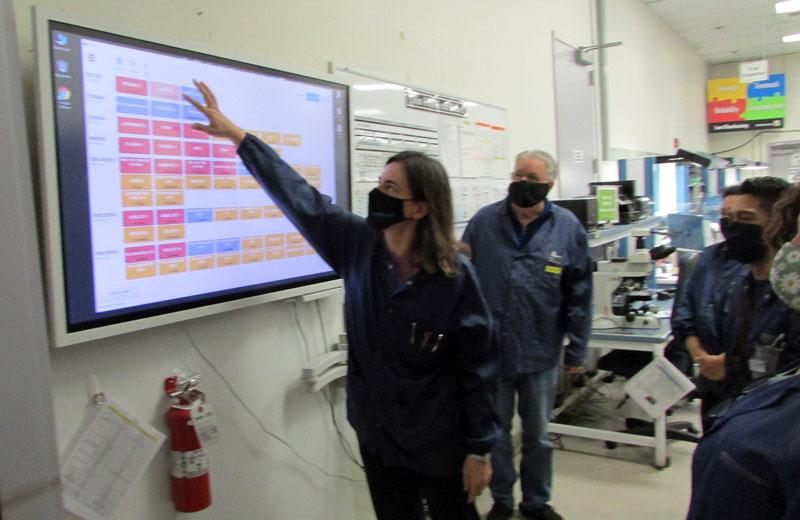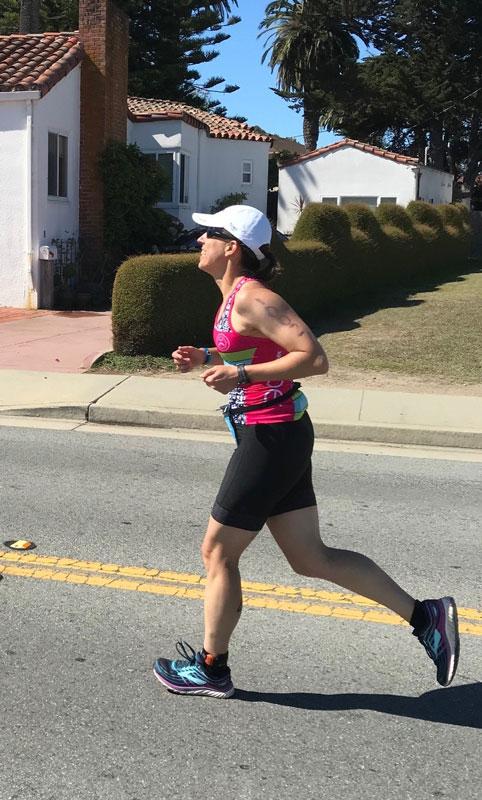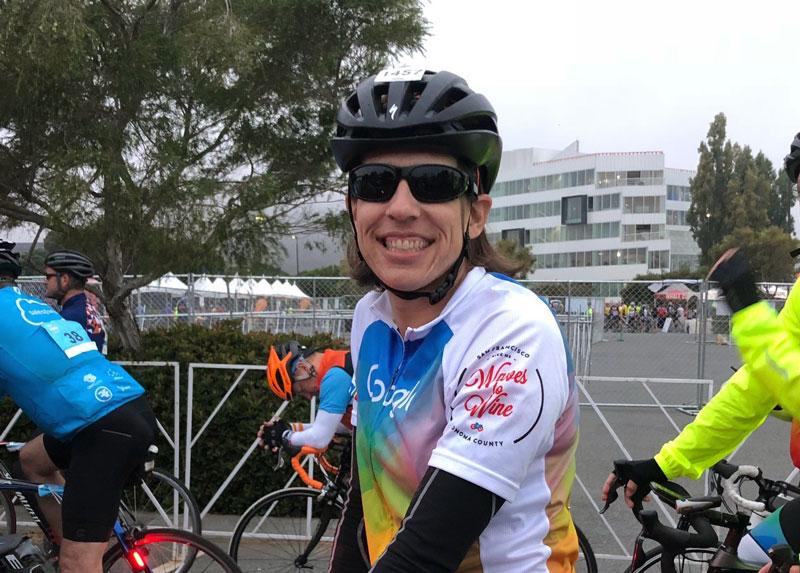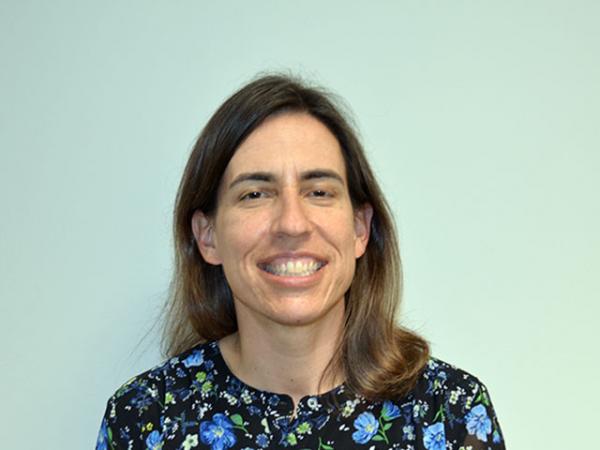What motivates you to wake up and go to work?
One motivation for me is that I’m always learning something new. The longer I've worked here, the more I’ve realized how much there is to learn. The other thing for me is the people. To be in a role where I feel like I can make a difference in the lives of those I work with, that's something that matters to me.
What do you do at CAES, and how long have you been with the company?
I’m the director of three of our manufacturing areas – thin film substrate manufacturing, package manufacturing and environmental screening. Thin film and packaging are feeder cells where we make piece parts that get integrated into our products. And environmental screening is at the back end of the process where we do our environmental stress testing on all of the fully built hardware. I oversee all aspects of production, from build plans, to our engineers, technical projects and equipment that we need to purchase. I work with our planners to address things like material shortages and also communicate up to management when there are issues that need to be resolved. I've been with the company 18 years.
What got you interested in becoming an engineer?
I've always liked math and science, but as I went into college, I was undecided. I don't really think I had an awareness of what engineering was at that time. My high school didn’t have a STEM program so engineering just wasn't something that was even on my radar. I was weighing options between something like biology or sports athletic training, but I just wasn't sure, career-wise, what I would do. In college, I was trying to decide, and my counselor, who knew I liked math and science, suggested I talk with the head of the mechanical engineering department. He really opened me up to the fact that with an engineering degree I could do pretty much anything. That was the best conversation, because that’s what brought me to where I am today and a career I really enjoy.
What is your proudest accomplishment of your career?
I’ve been proud of my ability to learn and pick things up and grow. Two examples come to mind. As an engineer, I was sent to a Lean Manufacturing/5S training at a customer, and upon coming back, I implemented the concepts in my group and eventually the whole company. The other was two years ago. We had decided we wanted to go more online versus a lot of paper records. I came up with a concept for tracking the status of equipment and worked with our software engineer to create a Factory Database system that is now used throughout our site to track repairs and maintenance of all our equipment and test stations. It’s neat to see when an idea you have can be effectively put into use.

Before working at CAES, what was your most unusual or interesting job?
In high school, I was a cemetery groundskeeper.
What has been the most important innovation you have witnessed in your lifetime?
The one that comes to mind is the cell phone. I mean, from the old-style phones on the wall when I was growing up to all you can do on a cell phone right now with the internet. That’s amazing.
Who was your most important mentor and why?
One was a person from our HR department. They were a big resource for me as I evolved in my career as a manager. Another mentor has been a manager that has been a really good technical and business resource for me.
What skill do you think everyone should learn and why?
The ability to do data analysis. There's so much data out there – whether you're gathering it, analyzing it or communicating it. Data analytics is valuable in any profession, but especially in engineering. A second one that comes to mind is people skills, which plays a huge role in any career. Being able to work with a variety of people and understand different perspectives is super helpful.
What's the best advice you can give to someone who's just starting their engineering career?
Learn what you're supposed to learn, work hard and show a commitment to your job. You will grow, and that will give you more opportunities as a result. I started out as an engineer, but when I learned that the company needed support on some completely unrelated projects, it became an opportunity for me to step into something new, and I ended up in a management role. So, I think it’s about coming in with an open attitude.
What’s something most people don’t know about you (your secret talent)?
I'm proud of the fact that I've done two IronMan triathlons. I like being outside. Exercising is a stress relief, and it gives me sense of pride to have completed endurance events like that.
Facts about Heidi
- Favorite travel spot?
- Somewhere I haven’t been. I enjoy traveling to new places and have visited quite a few countries already, but before I go back to one of them, there are more new places on my list to visit.
- Favorite news media or blog?
- The New York Times “The Daily” podcast
- What is your most-used mobile app?
- Strava. It's like Facebook for sports activities that shows your workouts and lets you see the workouts of others.
- What is the one food you can’t resist?
- Cookies
- Have you ever met someone famous?
- No
- If you could do another job for just one day, what would it be?
- A professional athlete – either basketball or bike racing
- If you could meet anyone in the world dead or alive who would it be and why?
- Bill Gates. I think both his business experience and how he's more focused now on philanthropic interests would lead to some interesting conversations and insights.
- What did you want to be when growing up?
- Athletic trainer
- What is the one thing you can’t live without?
- I'd say time alone. I work with a lot of people, and I really enjoy that and being around friends. But that downtime afterwards, where I can relax and recharge, is also really important to me.
- Where is your hometown?
- Roanoke, Illinois: population 2,000

Recap your journey from fledgling engineer to the leadership position you hold today. Was there a “master plan” that informed your career decisions?
For the first part of my journey, I had a mechanical engineering internship with the company. And I thought I'd come back after college in a design role, but CAES needed help in manufacturing. So, I agreed to try it. It turned out that I like manufacturing more than design. I think it's a better fit for my interest and skills. And then I was in this manufacturing and assembly group, and one day my manager said they were moving me over to the substrate manufacturing group. I hadn’t done anything with them before, but I said okay and moved over there, and that's actually where my career began to grow. I spent about seven years as an engineer and then was made manager of that group, and then I was given a second manufacturing group. Eventually, I became Director of the three areas that I'm currently managing today – thin film substrate manufacturing, package manufacturing and environmental screening.
As far as a master plan, I wouldn’t say that I came in with one. I've always been flexible and done the best I can and tried to see whatever I'm asked to do as an opportunity. And as a result, one thing just kind of naturally formed on top of the other. I feel very thankful and grateful.
Given that women are underrepresented in engineering – and engineering leadership – how did you ensure that you received recognition for your accomplishments? What challenges did you overcome?
Honestly, I’ve heard stories. But for me, I've been fortunate that CAES has been very open for women in engineering roles. I've been given equal opportunity as a female engineer. Leadership really focuses on people's abilities and not gender, so I don't really see that I have been limited myself. And I think one of the reasons I’ve stayed as long as I have is because I’m viewed as an engineer in the company and equal to my peers.
The one challenge I did have was when I moved into my management role. A few of the employees had a hard time with me as a manager and would challenge my authority. I don’t know if it was because I was a woman or my age, or both. When these kinds of challenging conversations would come up, I would connect with another manager or an HR manager more regularly, and that person acted as a mentor. I would discuss the situation and get input on how to deal with it. I think as a result I've continued to grow as a leader.
Describe the importance of mentorship within the engineering field – specifically for women engineers. How have your role models helped to guide you?
A mentor is someone you can go to who's not necessarily in your direct line of command. They have experience they can share or another perspective that you might not have considered previously. Sometimes it's a matter of just talking through a scenario. If you look around, even here where I've had a very open work environment, there just aren't many women engineers. It’s important for those of us leaders to be mentors for others and share our stories. We have a responsibility to promote women in engineering and make people aware of the opportunity that’s out there.
What is your most memorable leadership moment?
For me, it wasn't one big “in front of the spotlight moment.” I feel like the moments that stand out to me as a leader are when I've had to stand in front of my group and communicate information that will impact them personally. Or when I've had to make decisions that will impact the direction of the group. It's sort of like the captain of a ship. You may be steering it, but it's not like you're running things alone.

Do you believe that the technology industry has a responsibility to evangelize STEM as a viable career option for young girls? What would that look like?
I do. I didn't even consider engineering as an opportunity in high school, because I just wasn't aware of it. I don't have kids, but my sister and brother do. When I hear there are STEM programs at their schools that their kids enjoy, I think that’s playing a huge role in opening people up to what's out there. And part of that is having speakers come in and making sure women are part of those panels so young girls actually see women who have made careers in these roles.
What advice do you have for young women considering a STEM career?
If you like math and science, you should really consider a career in engineering or technology. I am so grateful for that one conversation in college that opened my eyes. I’d say I’m even more excited about engineering and technology today, because now I can see even more broadly how many different areas there are within STEM. It’s a fun and exciting place to be.
